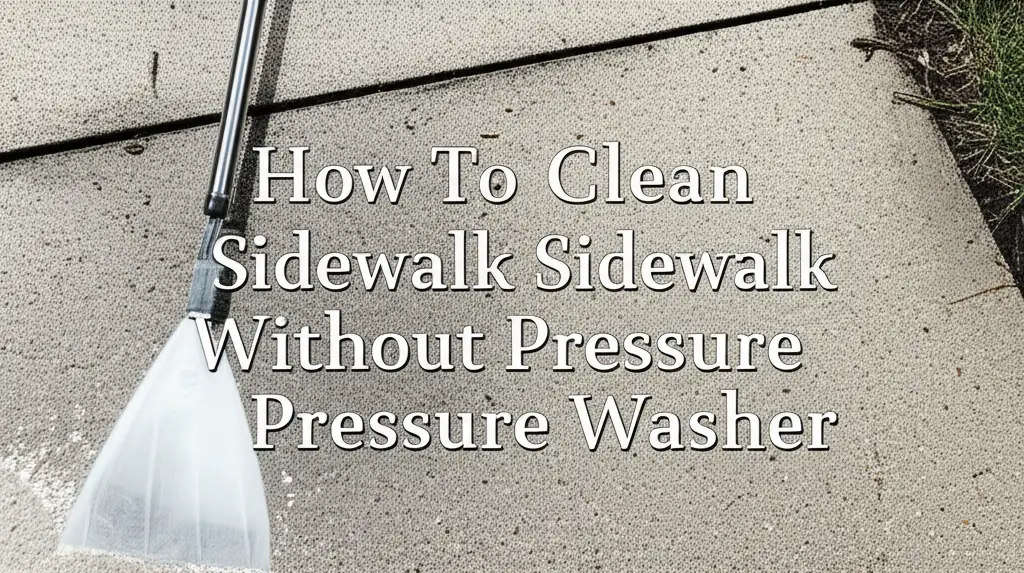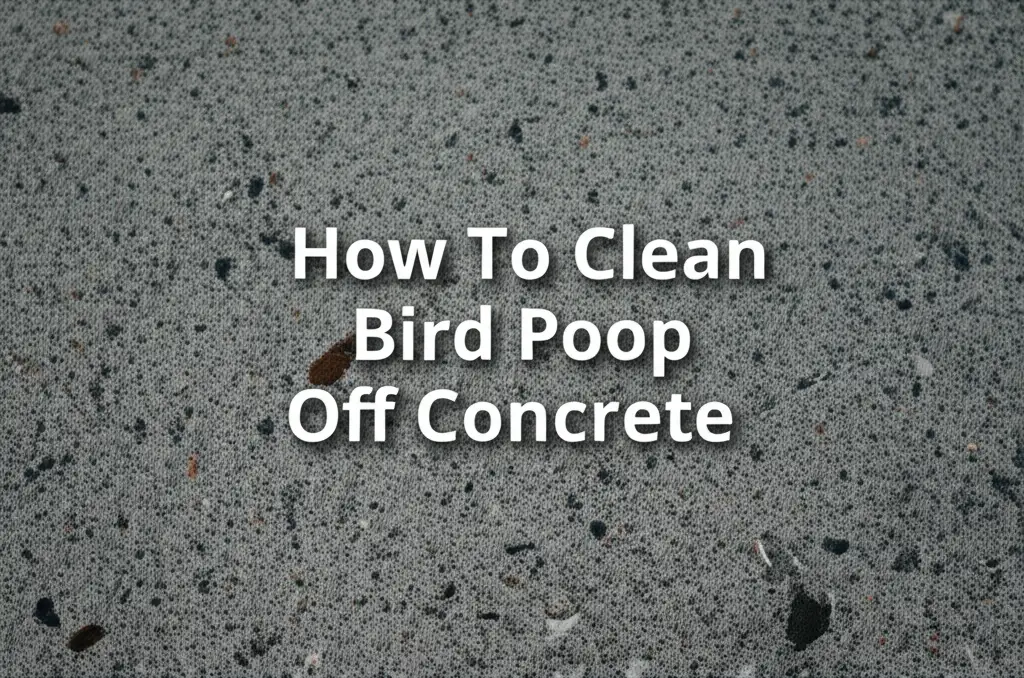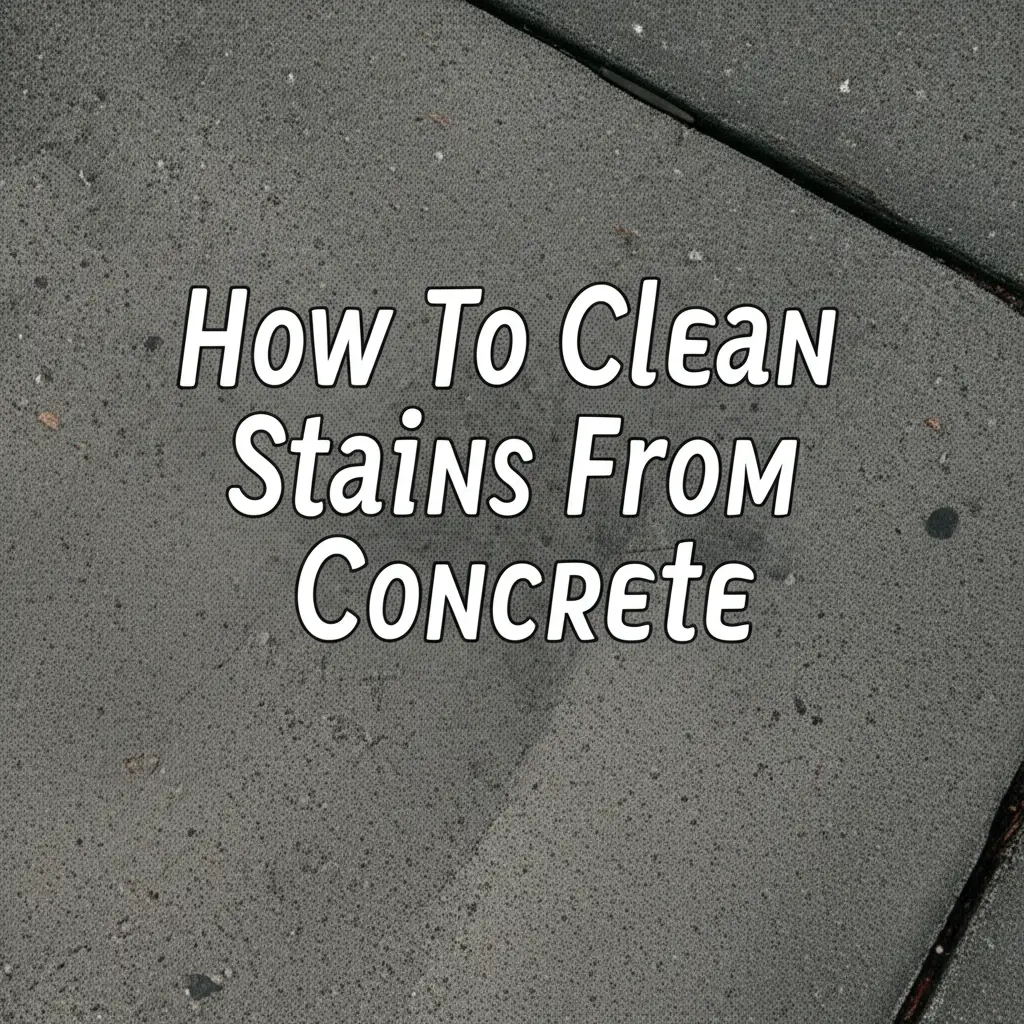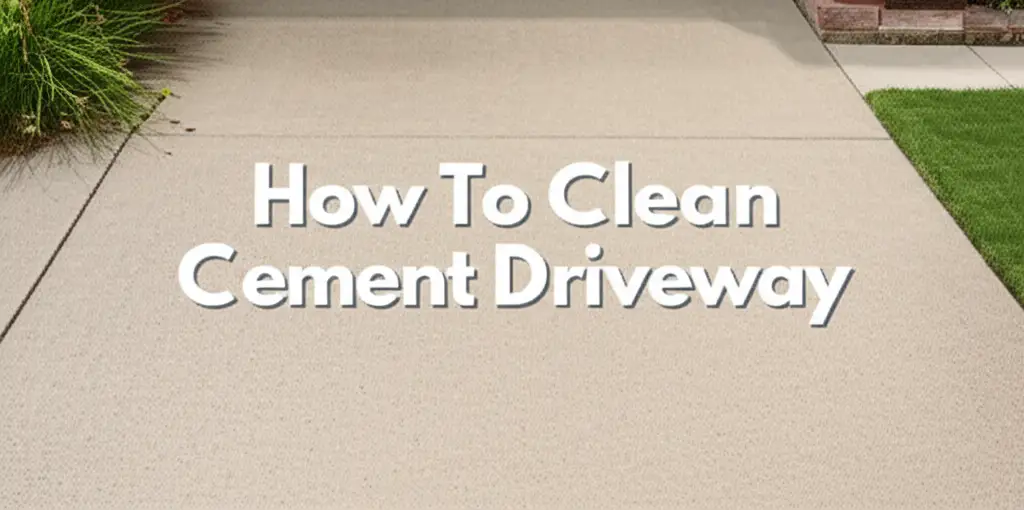· Outdoor Cleaning · 14 min read
How To Clean Driveway Without Pressure Washer A Guide
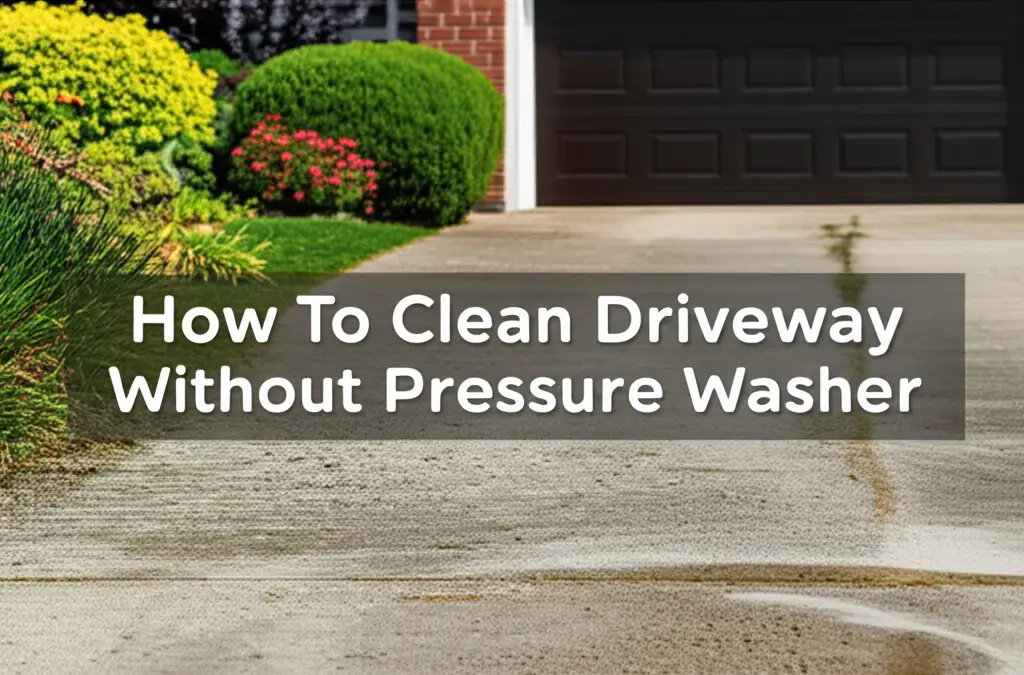
How To Clean Driveway Without Pressure Washer: A Guide
Is your driveway looking dull and dirty? You might think a powerful pressure washer is your only option for a deep clean. However, that is not true. You can achieve amazing results using simple tools and methods you likely already have.
Learning how to clean driveway without pressure washer saves money and protects your driveway surface. This guide covers everything you need to know. We will explore the right tools, effective cleaning solutions, and specific techniques for different types of stains. Get ready to transform your driveway into a clean, inviting space.
Takeaway:
- You can clean your driveway effectively without a pressure washer.
- Basic household tools and common cleaning agents work well.
- Different stains need specific cleaning methods for best results.
- Regular maintenance keeps your driveway looking good.
To clean a driveway without a pressure washer, use a stiff-bristled brush, a garden hose, and appropriate cleaning solutions like dish soap, baking soda, or oxygen bleach. Apply the solution, scrub stains manually, and rinse thoroughly to remove dirt and grime.
Why Clean Your Driveway Manually?
Cleaning your driveway by hand offers many advantages. A pressure washer can sometimes be too strong. It can damage certain driveway materials, like asphalt or older concrete. Manual cleaning gives you more control.
This method also uses less water than a pressure washer. This helps you save on water bills and is better for the environment. I find manual cleaning provides a good workout too. It is a satisfying way to improve your home’s curb appeal.
Essential Tools for Manual Driveway Cleaning
You do not need fancy equipment to clean your driveway manually. Simple, everyday items work perfectly. Gather these tools before you start. Having everything ready makes the cleaning process much smoother.
- Stiff-bristled broom: Use this to sweep away loose debris. It prepares the surface for scrubbing.
- Stiff-bristled scrub brush: This is your main tool for scrubbing stains. A long handle saves your back.
- Bucket(s): You will need buckets for mixing cleaning solutions and carrying water.
- Garden hose with spray nozzle: Essential for rinsing the driveway clean. A strong stream is helpful.
- Safety gear: Wear gloves to protect your hands from cleaning solutions. Safety glasses are also a good idea.
- Old towels or rags: These are useful for wiping up spills or applying specific treatments.
- Spray bottle: Good for spot treating smaller stains with concentrated solutions.
Basic Steps for a Spotless Driveway
A clean driveway starts with a good routine. Following these basic steps ensures you remove general dirt and grime effectively. This method works well for light to moderate build-up. I always start with these steps before tackling any tough stains.
- Clear the Area: Remove cars, toys, planters, and any other items from your driveway. This gives you a clear workspace.
- Sweep Thoroughly: Use your stiff-bristled broom to sweep away loose dirt, leaves, sand, and small rocks. Pay attention to corners and cracks. This step prevents turning dirt into muddy streaks during washing.
- Pre-Rinse: Use your garden hose to thoroughly wet the entire driveway. This loosens surface dirt and prepares the driveway for cleaning solutions. It also helps prevent cleaning solutions from drying too quickly.
- Apply Cleaning Solution: Mix your chosen cleaning solution in a bucket. For general cleaning, a simple mix of warm water and a few squirts of dish soap works well. Pour or spray the solution evenly over sections of your driveway. Let it sit for 10-15 minutes to penetrate the dirt.
- Scrub the Surface: Grab your stiff-bristled scrub brush. Work in small sections, scrubbing the entire surface with strong, circular motions. Focus on areas with visible dirt or grime. This physical action dislodges stubborn particles.
- Rinse Thoroughly: Use your garden hose to rinse the entire driveway from top to bottom. Make sure to rinse all the cleaning solution away. Leftover soap can leave a residue or create slippery spots. Rinse until the water runs clear.
- Allow to Dry: Let your driveway air dry completely. Avoid driving or walking on it while it is still wet. This prevents new dirt from sticking to the clean surface.
Cleaning Driveway Stains with Common Household Items
Many common household products are powerful stain removers for driveways. You do not need harsh chemicals for most spots. These methods are often safer for your family, pets, and plants. I have found these solutions to be surprisingly effective on various stains. You can also explore how these materials work together in general household cleaning with our guide on how to clean with vinegar and baking soda.
Tackling Oil and Grease Stains
Oil and grease spots are common and can be stubborn. Act quickly for best results. Fresh stains are much easier to remove than old ones.
- Absorb Excess: Sprinkle a generous amount of absorbent material on the fresh stain. Cat litter, sawdust, cornstarch, or baking soda work well. Let it sit for several hours or overnight to soak up the oil.
- Scrub with Soap: Sweep up the absorbent material. Then, pour a concentrated amount of liquid dish soap directly onto the stain. Dish soap is excellent at breaking down grease.
- Add Water and Scrub: Add a little warm water to the soap and scrub vigorously with your stiff brush. Let it sit for 15-30 minutes.
- Rinse: Rinse the area thoroughly with your garden hose. Repeat if needed. For very old or deep stains, you might need to repeat this process several times.
Removing Mold and Mildew
Mold and mildew thrive in damp, shady areas. They leave dark, unsightly patches. These growths can also make your driveway slippery and unsafe.
- Mix Solution: Create a solution of one part oxygen bleach (not chlorine bleach) to two parts warm water. Oxygen bleach is safer for most surfaces and plants. Alternatively, a solution of distilled white vinegar can work for lighter mold.
- Apply and Dwell: Apply the solution directly to the moldy areas. Let it sit for 20-30 minutes. The solution needs time to penetrate and kill the mold spores.
- Scrub: Use your scrub brush to work the solution into the surface. The mold should start to lift away.
- Rinse: Rinse the area thoroughly with your hose. Ensure all residue is gone. For stubborn patches, repeat the application and scrubbing.
Eliminating Rust Marks
Rust stains come from metal furniture, tools, or car parts left on the driveway. They can be tricky, but specific acids help break them down.
- Apply Acid: Pour white vinegar or lemon juice directly onto the rust stain. These natural acids help dissolve rust. You can also use commercial rust removers designed for concrete, following package directions.
- Let it Sit: Allow the acid to soak into the stain for 10-20 minutes. Keep the area moist.
- Scrub: Scrub the stain vigorously with your stiff brush. You should see the rust begin to lighten.
- Rinse: Rinse the area completely with water. Repeat the process if the stain persists. Avoid letting these acidic solutions dry on your driveway, as they can cause etching if left too long.
Dealing with Dirt and Grime
Everyday dirt and grime accumulate quickly on a driveway. Regular cleaning keeps this under control. This is where your basic cleaning steps shine.
- Sweep Loose Dirt: Always start by sweeping away any loose debris. This simple step makes a huge difference.
- Soapy Water Scrub: Mix warm water with a generous amount of liquid dish soap in a bucket. Apply this solution to the dirty areas.
- Scrub and Rinse: Use your stiff brush to scrub the dirty areas. The soap helps lift the grime from the surface. Then, rinse thoroughly with your garden hose. For large areas, work in sections.
Specialized Driveway Cleaning Solutions (Non-Pressure Washer)
Sometimes, household items are not quite enough for deeply embedded stains or very large areas. In these cases, specialized cleaning solutions designed for driveways can be helpful. These products are formulated to tackle tough stains without the need for high pressure.
Many commercial driveway cleaners are available at hardware stores. Look for cleaners that specify “no pressure washer required” or “manual application.” These often contain stronger detergents, enzymes, or mild acids tailored for concrete and asphalt. Always read the product label carefully for instructions and safety precautions. Some products require mixing with water, while others are ready to use. Apply them with a sprayer or watering can, let them sit as directed, and then scrub and rinse.
Enzyme cleaners are another option, especially for organic stains like pet waste or food spills. These cleaners contain beneficial bacteria that “eat” away at the organic matter, breaking down the stain and odor. They are generally very safe for surfaces and the environment. Apply enzyme cleaners, let them dwell for an extended period (sometimes hours), and then rinse. These are great for a deeper, natural clean. For comprehensive outdoor care, remember that these manual techniques can also be applied to other surfaces around your home, much like our advice for cleaning the outside of your house without a pressure washer.
Caring for Different Driveway Materials
Driveways come in various materials, and each has unique characteristics. Understanding your driveway’s surface helps you choose the gentlest and most effective cleaning methods. What works wonders on concrete might not be ideal for asphalt or pavers. Tailoring your approach ensures longevity and appearance.
Concrete Driveway Cleaning
Concrete is a durable and common driveway material. It is quite porous, meaning it can absorb stains if not sealed. Most of the methods discussed, like scrubbing with soap, baking soda, or oxygen bleach, work well on concrete. For tough spots, a mixture of water and a small amount of trisodium phosphate (TSP) can be very effective, but use it with caution and rinse thoroughly. Always test new solutions on an inconspicuous area first. Regular cleaning and sealing can keep your concrete driveway looking new. If you have a concrete patio, many of these methods also apply. Discover more tips in our guide on how to clean concrete patio without pressure washer.
Asphalt Driveway Cleaning
Asphalt driveways are made from a mixture of aggregate and bitumen, which is a petroleum-based binder. This material is more flexible and less rigid than concrete. It is also more sensitive to harsh chemicals and excessive scrubbing. Avoid using strong solvents or abrasive cleaners that can dissolve the asphalt binder. Mild dish soap and water are usually best for general cleaning. For oil stains, cat litter or sawdust works well for absorption, followed by a gentle scrub with dish soap. Avoid wire brushes, as they can damage the asphalt surface.
Paver Driveway Cleaning
Paver driveways are beautiful and add character, but they require specific care. They consist of individual blocks, often with sand or polymeric sand in the joints. This sand is crucial for stability. Avoid aggressive scrubbing that could dislodge the joint sand. A soft-bristled brush or broom is often sufficient for general cleaning. For stains, apply a mild cleaning solution (like dish soap and water) and gently scrub. Rinse carefully to avoid washing away the joint sand. After cleaning, you might need to reapply polymeric sand to the joints to maintain stability and prevent weed growth.
Eco-Friendly Driveway Cleaning Practices
Cleaning your driveway does not have to harm the environment. Many methods are effective and earth-friendly. Choosing eco-friendly options protects local waterways and plants. It also ensures a safer environment for children and pets playing nearby.
Use Biodegradable Soaps: Opt for dish soaps or general cleaners that are labeled “biodegradable” or “eco-friendly.” These products break down naturally and are less harmful when they enter storm drains. They clean effectively without leaving a toxic footprint. Check product ingredients for plant-based formulas.
Natural Stain Removers: Vinegar, baking soda, and lemon juice are excellent natural cleaners. They tackle many common driveway stains without harsh chemicals. Vinegar works well on mildew, and baking soda absorbs oil. These ingredients are safe and readily available. They are also gentle on surrounding landscaping.
Conserve Water: Even without a pressure washer, you can still use a lot of water. Use a hose nozzle with a shut-off valve. Only turn on the water when you are actively rinsing. Work in small sections, rinsing each one completely before moving on. Consider collecting rainwater for future rinsing if you have a system.
Proper Disposal of Runoff: If you use strong commercial cleaners, try to divert the runoff away from storm drains and sensitive plants. Some driveways slope directly into public storm drains, which lead to rivers or oceans. For very heavy-duty cleaning, consider using absorbent materials to soak up chemical-laden water, then dispose of them properly. Always follow local regulations for chemical disposal.
Preventive Measures for a Cleaner Driveway
The best way to keep your driveway clean is to prevent it from getting too dirty in the first place. A little regular maintenance goes a long way. These simple habits can save you time and effort on major cleaning projects. I follow these steps myself to keep my driveway looking good year-round.
Regular Sweeping: Make sweeping your driveway a weekly or bi-weekly habit. Use a stiff broom to remove leaves, dirt, and debris. This prevents organic matter from breaking down and staining the surface. It also keeps small stones from getting tracked into your home.
Immediate Spill Cleanup: Act quickly when spills happen. Oil, grease, paint, or chemicals can cause permanent stains if left untreated. Blot up fresh spills with absorbent materials like cat litter or sawdust. Then, clean the area with appropriate solutions immediately. The faster you respond, the better your chances of full removal.
Use Drip Pans: If you park vehicles on your driveway, place drip pans under them. This catches oil, transmission fluid, or coolant leaks. Drip pans are inexpensive and protect your driveway from stubborn automotive stains. This simple step prevents a lot of headaches later.
Seal Your Driveway: Consider sealing your driveway every few years, especially if it is concrete or asphalt. A sealant creates a protective barrier on the surface. This barrier helps repel water, oil, and other stains. It also makes future cleaning much easier and extends the life of your driveway material. Always choose a sealant appropriate for your specific driveway type.
Frequently Asked Questions
Q1: Is it safe to use bleach on my concrete driveway?
A: You should avoid using chlorine bleach on concrete driveways. It can cause discoloration, damage the surface, and harm nearby plants and animals. Instead, use oxygen bleach, white vinegar, or specialized concrete cleaners. These options are safer and less corrosive.
Q2: How often should I clean my driveway without a pressure washer?
A: The cleaning frequency depends on factors like traffic, weather, and surrounding trees. For general maintenance, a light cleaning every few months is good. Tackle specific stains as soon as they appear. A deep scrub might be needed once or twice a year for best results.
Q3: Can I use a regular deck cleaner on my driveway?
A: Many deck cleaners are safe for use on concrete and some other driveway materials. Always check the product label to ensure it is suitable for your specific driveway type. Test it on a small, hidden area first. Deck cleaners often contain similar ingredients to driveway cleaners.
Q4: What is the best way to remove tire marks from a driveway?
A: Tire marks are tough but not impossible. Try scrubbing with a strong solution of baking soda and dish soap. For stubborn marks, a stiff brush and a commercial concrete cleaner designed for rubber may be necessary. Apply, scrub well, and rinse.
Q5: Will cleaning my driveway manually damage it?
A: No, cleaning your driveway manually with appropriate tools and solutions will not damage it. In fact, it is often gentler than using a pressure washer, which can cause etching or damage if not used correctly. Manual cleaning allows for precise stain treatment.
Q6: How can I prevent weeds from growing in my driveway cracks?
A: Regular sweeping helps remove seeds before they can sprout. Pour boiling water directly into cracks to kill existing weeds. You can also use a vinegar solution or commercial weed killers. Sealing cracks and re-sanding paver joints helps prevent future growth.
Conclusion
You now know that achieving a clean, sparkling driveway does not require a pressure washer. With the right tools and a little effort, you can effectively tackle dirt, grime, and stubborn stains. We covered everything from essential tools like stiff brushes and garden hoses to powerful yet simple cleaning agents like dish soap, baking soda, and oxygen bleach.
Remember to tailor your cleaning approach to your driveway material, whether it is concrete, asphalt, or pavers. Embracing eco-friendly practices helps protect our environment while keeping your home looking its best. By incorporating these manual cleaning methods and preventive measures into your routine, you can maintain a beautiful driveway year-round. Get started today and see the remarkable difference you can make!
- Driveway cleaning
- Manual cleaning
- Concrete cleaning
- Eco-friendly cleaning
- Outdoor maintenance
- Stain removal
- DIY cleaning

